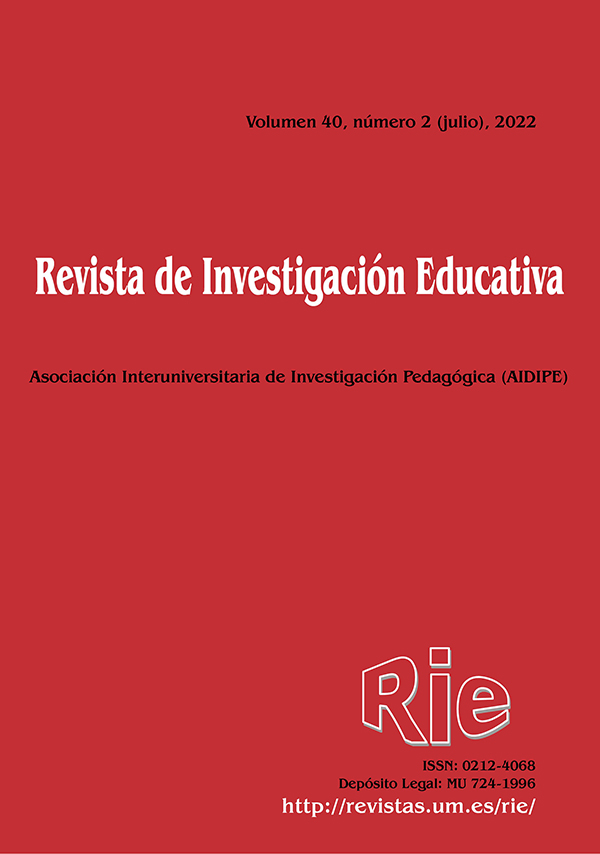Contributions and difficulties valued by participants in an educational innovation process from Pre-school to High school
Supporting Agencies
- Universitat de Vic-UCC
Abstract
Educational innovations to improve teaching, learning, and evaluation processes have been studied from different perspectives in recent years. The aim of this article is to present the contributions and difficulties perceived and valued by the different educational agents involved (teachers, students, families, and management team). Using a qualitative methodology and relying on the multiple-case study method, this paper shows a contribution in the type and nature of learning, as well as in cooperative, relational and emotional learning. Likewise, the teacher’s dedication, his/her training and accompaniment, and the need for greater collaboration among the agents are regarded as difficulties. These results are in line with previous research, although they provide an overview of all the agents involved. In conclusion, this study highlights the need for greater involvement of all educational agents promoted by the management team and greater publicity of the innovation process to legitimize it and link it to the social reality.
Downloads
-
Abstract1820
-
PDF (Español (España))1622
References
Aramendi, P. (2010). La innovación educativa en el País Vasco. Inclusión, equidad e integración europea. Profesorado: Revista de currículum y formación del profesorado, 14(1), 135-152. Dialnet. https://dialnet.unirioja.es/servlet/articulo?codigo=3187077
Bamber, V. y Anderson, S. (2012). Evaluating learning and teaching: institutional needs and individual practices. International journal for academic development, 17(1), 5-18. https://doi.org/10.1080/1360144X.2011.586459
Boulay, B. y Goodson, B. (2018). The investing in innovation fund: summary of 67 evaluation. Final report. IES. https://ies.ed.gov/ncee/pubs/20184013/pdf/20184013.pdf
Caliskan, A. y Zhu, C. (2019). Organizational culture and educational innovations in Turkish high education: perceptions and reactions of students. Educational sciences: theory & practice, 20(1), 20-39. https://doi.org/10.12738/jestp.2020.1.003
Chalmers, D. y Gardiner, D. (2015). The measurement and impact of university teacher development programs. Educar, 51(1), 53-80. http://dx.doi.org/10.5565/rev/educar.655
EAF y EVPA. (2015). Guía práctica para la medición y la gestión del impacto. EAF. http://www.fundaciones.org/EPORTAL_DOCS/GENERAL/AEF/DOC-cw5537916e2a002/GuIa_impacto-EVPA-AEF-2015.pdf
Folch, C., Capdevila, R. y Prat, M. (2019). Percepción del Profesorado sobre una Experiencia Multidisciplinar: Arte y Ciencias en un Grado de Educación. Revista de Investigación y Docencia Universitaria, 13(1), 38-56. http://doi.org/10.19083/ridu.2019.743
Greany, T. (2018). Innovation is possible, it's just not easy: improvement, innovation and legitimacy in England's autonomous and accountable school system. Educational management administration & leadership, 46(1), 65-85. http://doi.org/10.1177/1741143216659297
Gonzales, R. y Callueng, C. (2014). Classroom assessment practices of Filipino teachers: measurement and impact of professional development. En C. Margno y M. J. Gaerlan (Ed.),Essential of counseling education (pp. 202-242). http://doi.org/10.13140/2.1.1950.3685
Gordon, S. P., Oliver, J. y Solis, R. (2016). Successful innovations in educational leadership preparation. International journal of educational leadership preparation, 11(2), 51-70. ERIC. https://eric.ed.gov/?q=educational+innovation&id=EJ1123995
INTEF. (2014). Educación inclusiva: Iguales en la diversidad. INTEF. http://formacion.intef.es/pluginfile.php/110315/mod_resource/content/3/Inclusiva_14_10_14_B4_T2_cambiomejoraeinnovacion.pdf
King-Sears, M. E. y Strogilos, V. (2020). An exploratory study of self- efficacy, school belongingness, and co-teaching perspectives from middle school students and teachers in a mathematics co-taught classroom. International Journal of Inclusive Education, 24(2), 162-180.http://doi.org/10.1080/13603116.2018.1453553
Lago, J. R. y Onrubia, J. (2008). Una estrategia general de asesoramiento para la mejora de la práctica educativa. Profesorado. Revista de currículum i formación del profesorado, 12(1).
Merriam, S. B. (1998). Qualitative research and case study applications in education. Jossey-Bass.
Moya, B., Turra, H. y Chalmers, D. (2019). Developing and implementing a robust and flexible framework for the evaluation and impact of educational development in higher education in Chile. International Journal for Academic Development, 24(2), 163-177. http://doi.org/10.1080/1360144X.2018.1555757
Pujolàs, P., Lago, J. R., Naranjo, M., Pedragosa, O., Riera, G., Soldevila, J., Olmos, G., Torner, A. y Rodrigo. C. (2011). El programa CA/AC (“Cooperar para Aprender / Aprender a Cooperar”) para enseñar a aprender en equipo. Implementación del aprendizaje cooperativo en el aula. Elizalde. https://www.elizalde.eus/wp-content/uploads/izapideak/CA-ACprograma.pdf
Stake, R. E. (1995). The art of case study research. SAGE Publications.
Solheim, K., Roland, P. y Ertesvåg, S. K. (2018). Teachers’ perceptions of their collective and individual learning regarding classroom interaction. Educational Research, 60(4), 459-477.http://doi.org/10.1080/00131881.2018.1533790
Susinos, T. y Haya, I. (2014). Developing student voice and participatory pedagogy: a case study in a Spanish primary school. Cambridge journal of education, 44(3), 385-399. http://dx.doi.org/10.1080/0305764X.2014.914155
OECD. (2014). Measuring innovation in education: a new perspective, Education research and innovation. OECD Publising. https://dx.doi.org/10.1787/9789264215696-en
Veloso, L., Marques, J. S. y Duarte, A. (2014). Changing education through learning spaces: impacts of the Portuguese school buildings' renovation programme. Cambridge journal of education, 44(3), 401-423. http://dx.doi.org/10.1080/0305764X.2014.921280
Vieluf, S., Kaplan, D., Klieme, E. y Bayer, S. (2012). Teaching practices and pedagogical innovation: evidence from TALIS. OECD Publishing. http://dx.doi.org/10.1787/9789264123540-en
Vincent-Lancrin, S., Urgel, J., Soumyajit, K. y Jacotin, G. (2019). Measuring innovation in education, 2019: What has changed in the classroom? Educational Research and innovation. OECD Publishing. https://doi.org/10.1787/9789264311671-en
Walder, A. M. (2014). The preliminary and subsequent stages to integrating pedagogical innovation: the crux of the matter for the innovator. Alberta journal of educational research, 60(1), 22-42.
Copyright (c) 2022 Journal of Educational Research

This work is licensed under a Creative Commons Attribution-NonCommercial-NoDerivatives 4.0 International License.
The articles and scientific documents published in RIE abide the following conditions:
1. The Servicio de Publicaciones de la Universidad de Murcia (the publisher) has the property rights (copyright) of all the documents published and allows the reuse under the user’s license indicated in point 2.
2. All documents are published in the digital edition of RIE under a Creative Commons Reconocimiento-NoComercial-SinObraDerivada 4.0 Internacional. (legal document) license. These documents can be copied, used, distributed, communicated and explained publicly if: i) the author(s) and its original source of publishing (magazine, publisher and URL of the document) are cited; ii) it is not used for commercial purpose; iii) the existence and the specifications about this license are mentioned.
3. Auto-archive’s conditions. The authors are allowed and encouraged to digitally distribute the pre-print versions (a version before evaluation) and/or post-print (a version that it is already evaluated and accepted to its publication). This promotes circulation and distribution earlier and can increase the citations and significance within the academic community.









